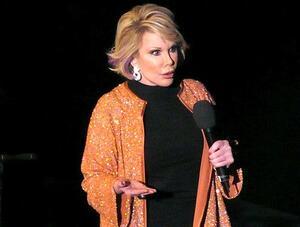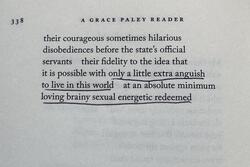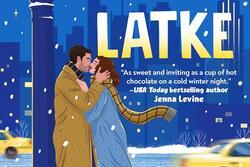Joan Rivers and Jewish Comedy: A Remembrance
“I am not the ideal Jewish woman,” Joan Rivers admits in a comedy act filmed in the Jewish Women’s Archive film, Making Trouble. “I love to take [my audience] to the edge,” she says. “I love to get them upset . . . And ruin their value system.” Known for her aggressiveness and her “unkosher” bawdy style, in critic Sarah Cohen’s words, Rivers (nee Joan Molinsky), Phi Beta Kappa Barnard graduate and daughter of a Brooklyn Jewish doctor, performed for over forty years. Making her television debut on Johnny Carson’s Tonight Show in 1965, she went on to host a daytime talk show, became the first solo guest host of the Tonight Show, and by 1986 had her own late night show on the new Fox Network. In 1990, Rivers won an Emmy for Outstanding Talk Show Host. She also authored two successful books, Having A Baby Can Be A Scream (1975) and Life and Times of Heidi Abromowitz (1984) and wrote and starred in a well-reviewed Broadway drama based on the life of Lenny Bruce’s mother, Sally Marr and Her Escorts (1994).
Rivers struggled for many years to find her comic style. She bombed in the Catskills, feeling she was not “ethnic enough,” and disliked the model followed by pioneer women comedians of the time, like Phyllis Diller, who were, “basically doing a woman’s version of men’s acts.” Working with her comic “soul mate,” writer Treva Silverman, Rivers began to find her comic voice. Elaine May served as a role model for both women: Rivers called May “an assertive woman with a marvelous, fast mind and, at the same time, pretty and feminine. We did not know any other women like that.”
Rivers’ breakthrough came at Second City, where she started in 1961. But Rivers was not the typical compliant Second City girl, and she found the troupe’s unwillingness to treat her as an equal deeply troubling. Nonetheless, she felt she was born as a comedian at Second City. Seeing Lenny Bruce perform for the first time in Greenwich Village became another turning point. From Bruce, she learned that “personal truth can be the foundation of comedy.” “I had found the key,” Rivers recalled.
Rivers created a character named Rita, the “urban ethnic loser girl who cannot get married,” who she thought was the secret of her success, allowing Rivers to turn autobiography into comedy and touch all women. Rita was Joan Rivers, in all her desperation: Unlucky in love, self-deprecating and hypercritical. Rita worked because “people recognize insecurity and respond to it,” said Rivers, because “everybody is like me.”
Rivers understood that she was part of a new transitional comedy generation which was leaving the one-line joke litany of traditional comics far behind. May had been a pioneer of the new style–a much more “personal comedy” that described “humor behavior by describing our own behavior.” Rivers used this style to talk openly about her emotional travails, and also about sex. “I was becoming a nice Jewish girl in stockings and pumps saying on stage what people thought but never said aloud in polite society.” Mentioning the word “tampons,” she recalled, was the greatest challenge of her career. Despite her edgy routines, she never downplayed her Jewishness, even though her agent often warned her that she was “too Jewish” and “too New York” for much of the country.
The self-deprecatory style that became the Rivers’ trademark coexisted with a much more aggressive humor that targets others, often with great cruelty. Sarah Blacher Cohen thought that Rivers resembled the traditional yente, a “scandal-spreader and rumormonger.” But Rivers offered a contrast to these routines through her “Heidi Abromowitz” character–her “comically spiteful portrayal of the nice Jewish girl’s direct opposite, the sexual transgressor . . . the whore with the heart of gold.” Over her long career, Rivers also introduced feminist characters, with hostile jokes aimed at gynecologists and others in the male power structure who demeaned women.
Whichever the routine, Rivers spit out nervy jokes full of chutzpah. To some critics, she was “abrasive, tasteless, profane.” Rivers defended herself against such charges: “You have to be abrasive to be a current comic. If you don’t offend someone, you become pap.” “Comedy is power,” she said. “The only weapon more formidable than humor is a gun.”






